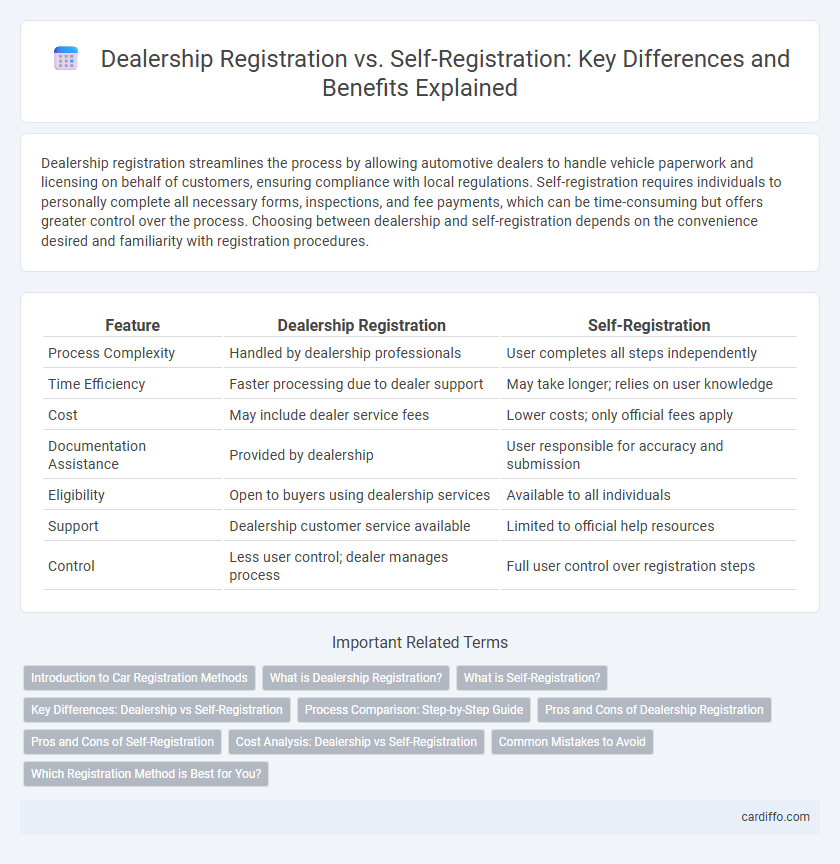Dealership registration streamlines the process by allowing automotive dealers to handle vehicle paperwork and licensing on behalf of customers, ensuring compliance with local regulations. Self-registration requires individuals to personally complete all necessary forms, inspections, and fee payments, which can be time-consuming but offers greater control over the process. Choosing between dealership and self-registration depends on the convenience desired and familiarity with registration procedures.
Table of Comparison
| Feature | Dealership Registration | Self-Registration |
|---|---|---|
| Process Complexity | Handled by dealership professionals | User completes all steps independently |
| Time Efficiency | Faster processing due to dealer support | May take longer; relies on user knowledge |
| Cost | May include dealer service fees | Lower costs; only official fees apply |
| Documentation Assistance | Provided by dealership | User responsible for accuracy and submission |
| Eligibility | Open to buyers using dealership services | Available to all individuals |
| Support | Dealership customer service available | Limited to official help resources |
| Control | Less user control; dealer manages process | Full user control over registration steps |
Introduction to Car Registration Methods
Car registration methods primarily include dealership registration and self-registration, each offering distinct processes and benefits. Dealership registration streamlines vehicle paperwork by having the dealer handle all administrative tasks, ensuring compliance and quick turnover. Self-registration requires the vehicle owner to personally submit documents to the DMV, often providing more control but demanding increased time and familiarity with legal requirements.
What is Dealership Registration?
Dealership registration involves a third-party authorized dealer managing the registration process on behalf of customers, streamlining vehicle documentation and title transfers. This method ensures compliance with local regulations and often includes additional services like financing and insurance facilitation. Dealership registration saves time and reduces errors compared to self-registration, where individuals submit all paperwork independently.
What is Self-Registration?
Self-registration allows users to independently create accounts or enroll in services without dealer or intermediary involvement, streamlining access and reducing administrative delays. This process typically requires individuals to provide necessary identification and complete verification steps to confirm eligibility. Compared to dealership registration, self-registration offers greater control and flexibility, enabling faster onboarding and personalized user experiences.
Key Differences: Dealership vs Self-Registration
Dealership registration involves a third-party dealer handling vehicle or product registration on behalf of the customer, offering convenience and expert assistance, while self-registration requires the individual to complete the process independently through official platforms or offices. Key differences include the level of support, with dealerships providing personalized service and potential added fees, whereas self-registration is typically cost-effective but demands familiarity with regulatory procedures and documentation. Dealership registration often expedites the process, whereas self-registration provides full control and transparency over each step.
Process Comparison: Step-by-Step Guide
Dealership registration involves a centralized process where the dealer handles all paperwork, vehicle inspections, and fee submissions on behalf of the buyer, streamlining the transaction and reducing individual effort. Self-registration requires the vehicle owner to personally navigate each step, including submitting documents, scheduling inspections, and paying fees at the local Department of Motor Vehicles (DMV), which may be time-consuming and demand meticulous attention to detail. Comparing both, dealership registration offers convenience and faster processing, whereas self-registration provides direct control but entails more individual responsibility and potential delays.
Pros and Cons of Dealership Registration
Dealership registration offers convenience by allowing multiple vehicles to be registered through a single entity, streamlining paperwork and saving time for customers. It often comes with professional assistance, reducing errors and ensuring compliance with regulatory requirements, though it may involve additional fees and reduced personal control over the registration process. In contrast, self-registration provides direct oversight and cost savings but requires more effort and familiarity with administrative procedures.
Pros and Cons of Self-Registration
Self-registration offers users a quick and autonomous way to create accounts without intermediary involvement, reducing dependency on dealership assistance and expediting the onboarding process. However, self-registration may result in data inaccuracies or incomplete profiles due to the absence of guided verification, potentially complicating future interactions or support requests. The lack of personalized assistance can also pose challenges for users unfamiliar with the system, impacting overall registration effectiveness and user satisfaction.
Cost Analysis: Dealership vs Self-Registration
Dealership registration typically involves higher upfront fees and service charges compared to self-registration, where individuals pay only government-mandated costs. Dealerships may offer convenience and bundled services, potentially reducing time but increasing overall expenses by 15-30%. Self-registration requires more personal effort but results in savings of approximately $50-$150 depending on vehicle type and state regulations.
Common Mistakes to Avoid
Dealership registration often involves incorrect documentation submission, leading to processing delays or rejections, while self-registration mistakes typically include incomplete forms and failure to verify identity promptly. Overlooking specific state or regulatory requirements in both methods can result in non-compliance and legal complications. Ensuring accurate data entry, timely submission, and thorough understanding of jurisdictional rules is essential to avoid common pitfalls in registration processes.
Which Registration Method is Best for You?
Dealership registration offers convenience and expert handling of paperwork, making it ideal for those seeking hassle-free vehicle registration with dealer assistance. Self-registration provides greater control and can be more cost-effective for individuals familiar with the process and paperwork requirements, allowing direct interaction with the DMV. Choosing the best method depends on your comfort level with administrative tasks, budget considerations, and the value you place on convenience versus control.
Dealership Registration vs Self-Registration Infographic

 cardiffo.com
cardiffo.com